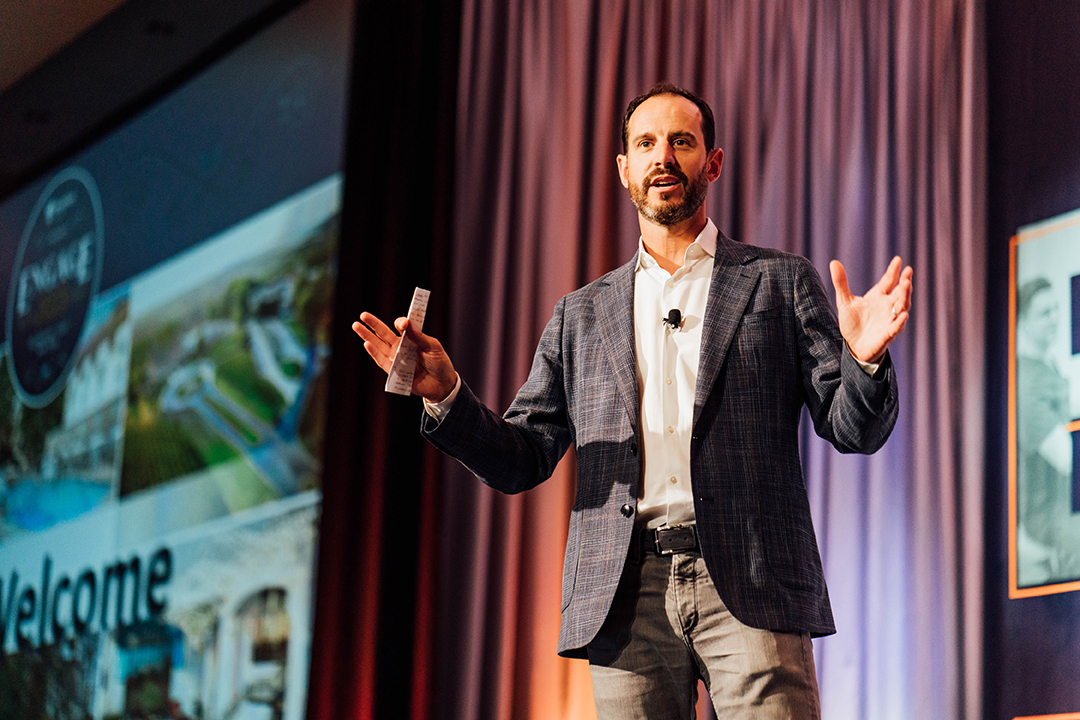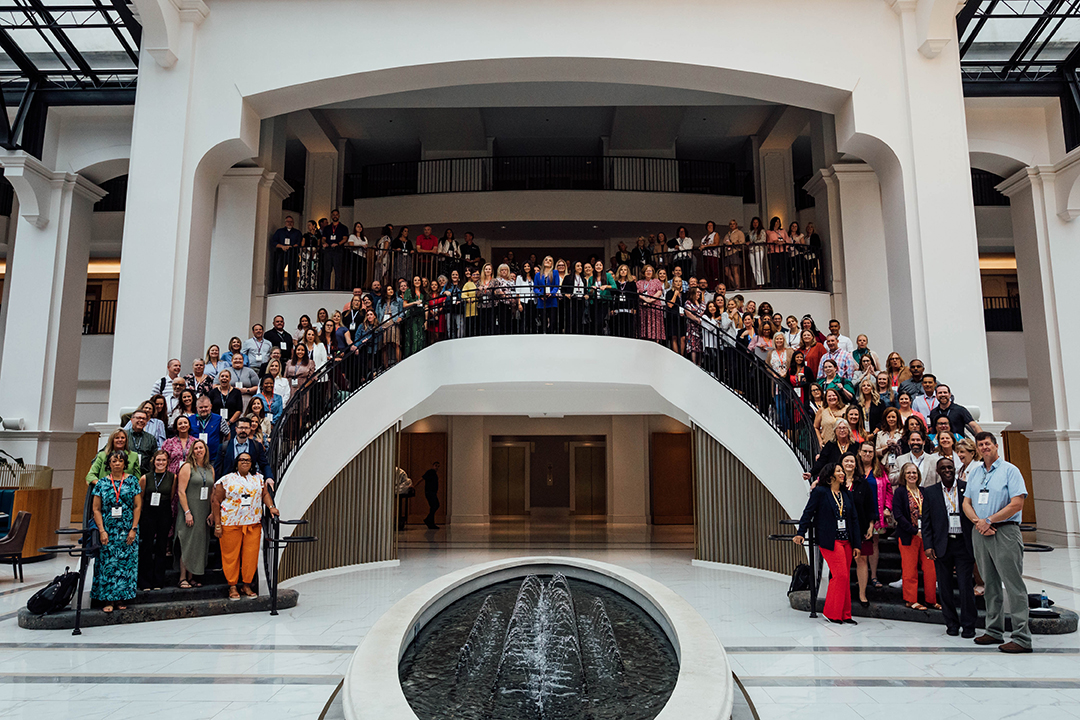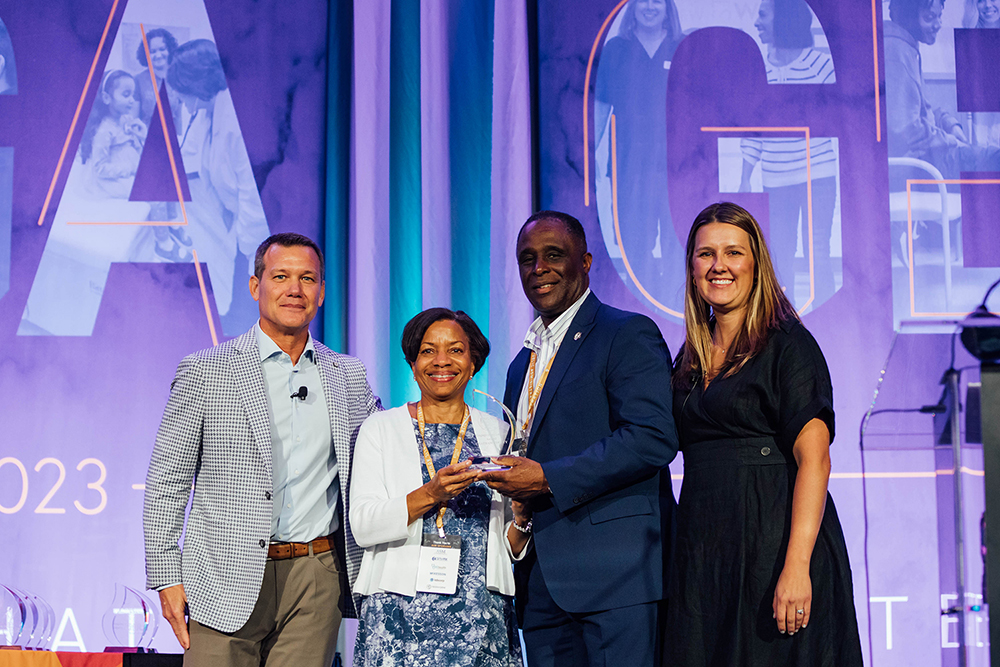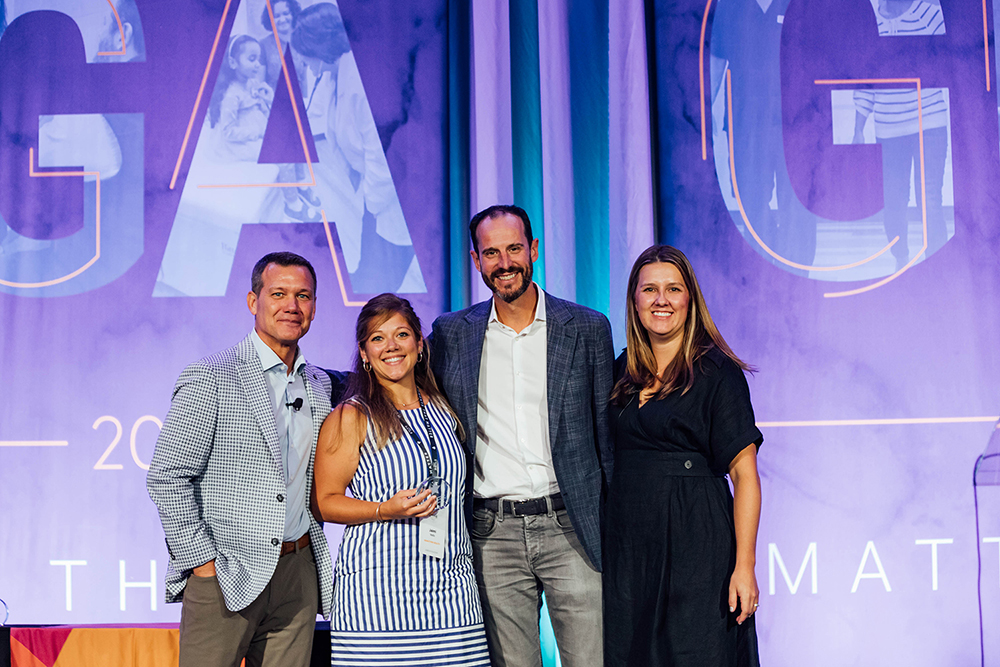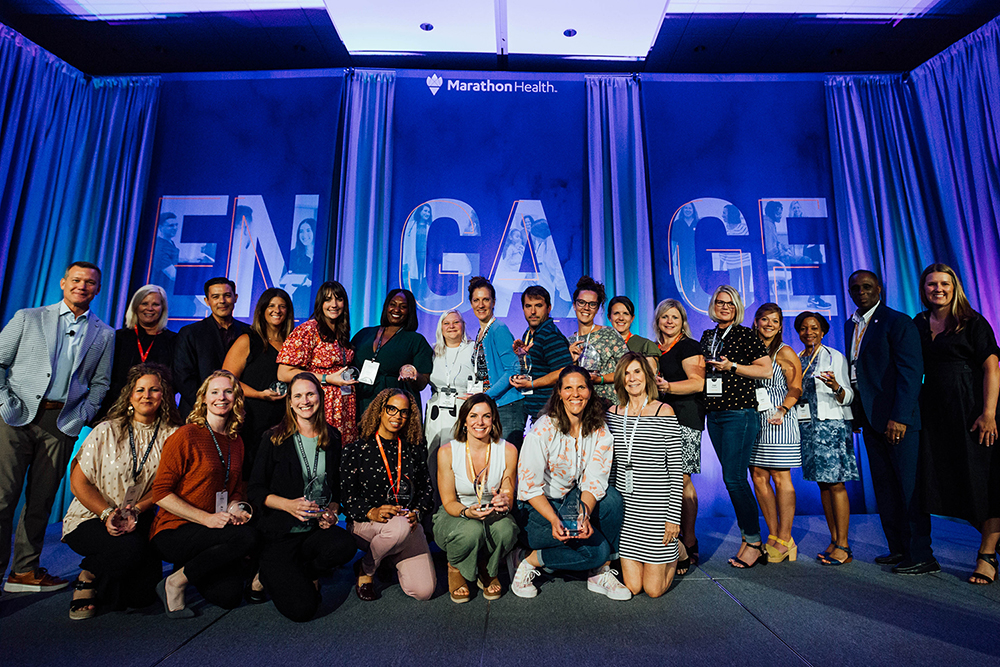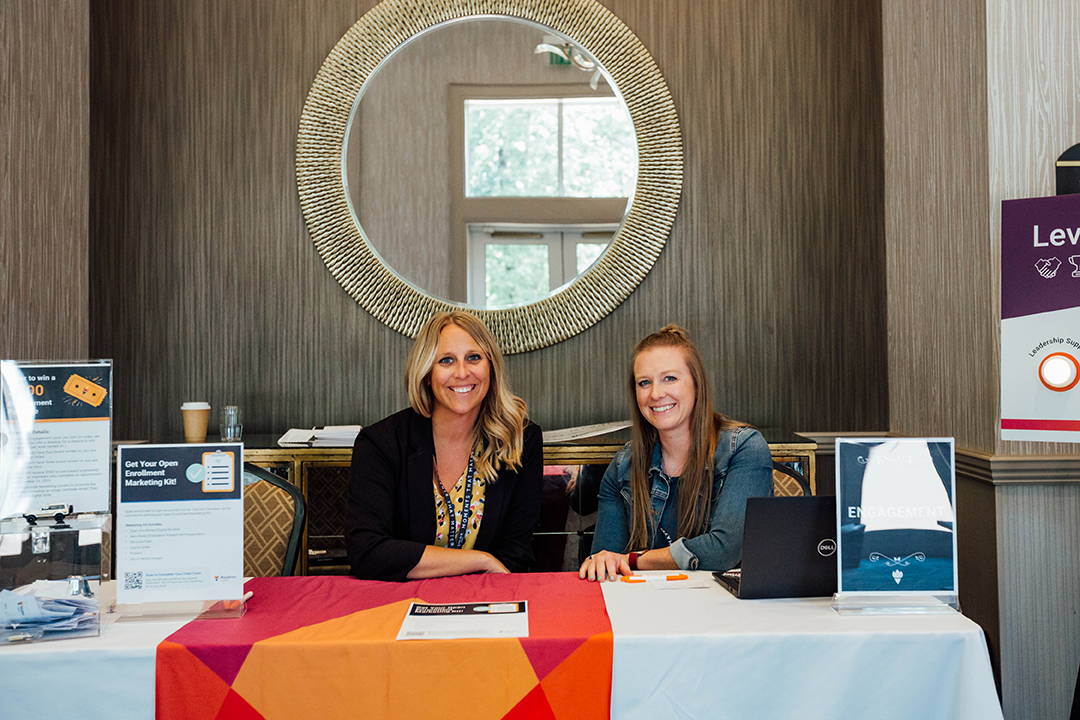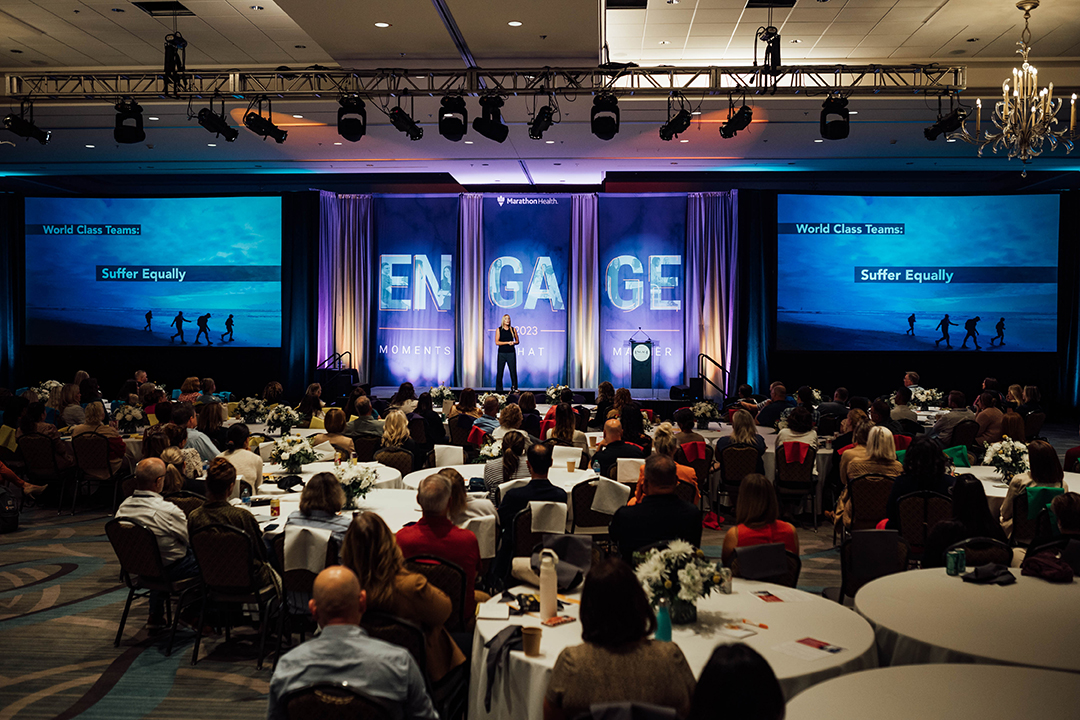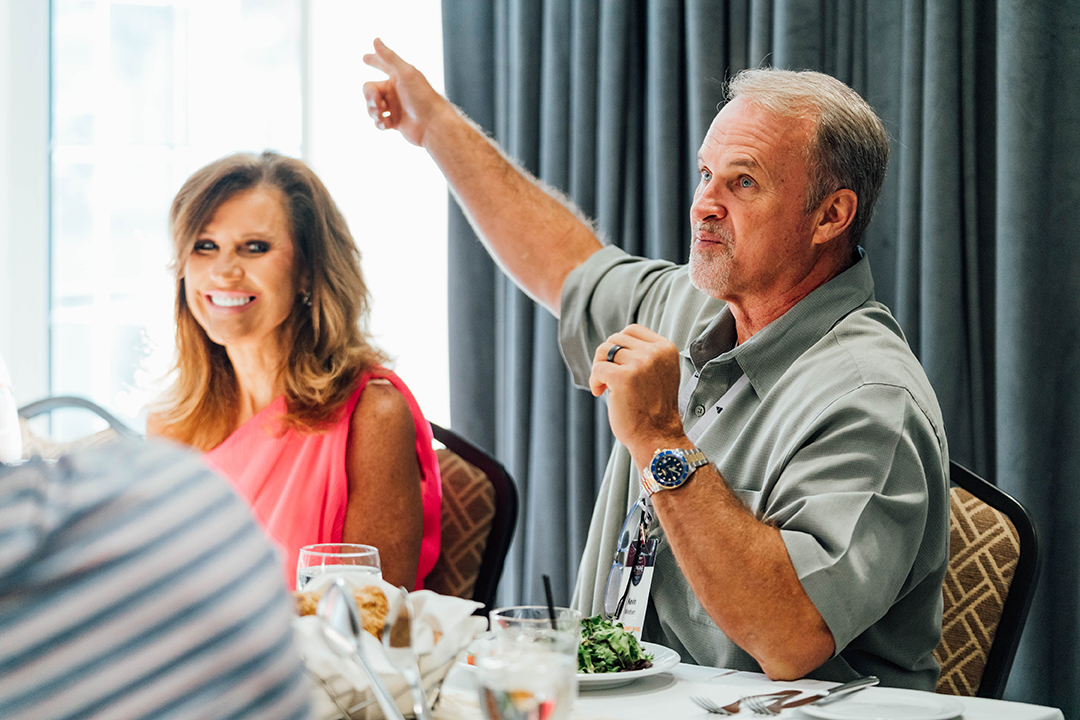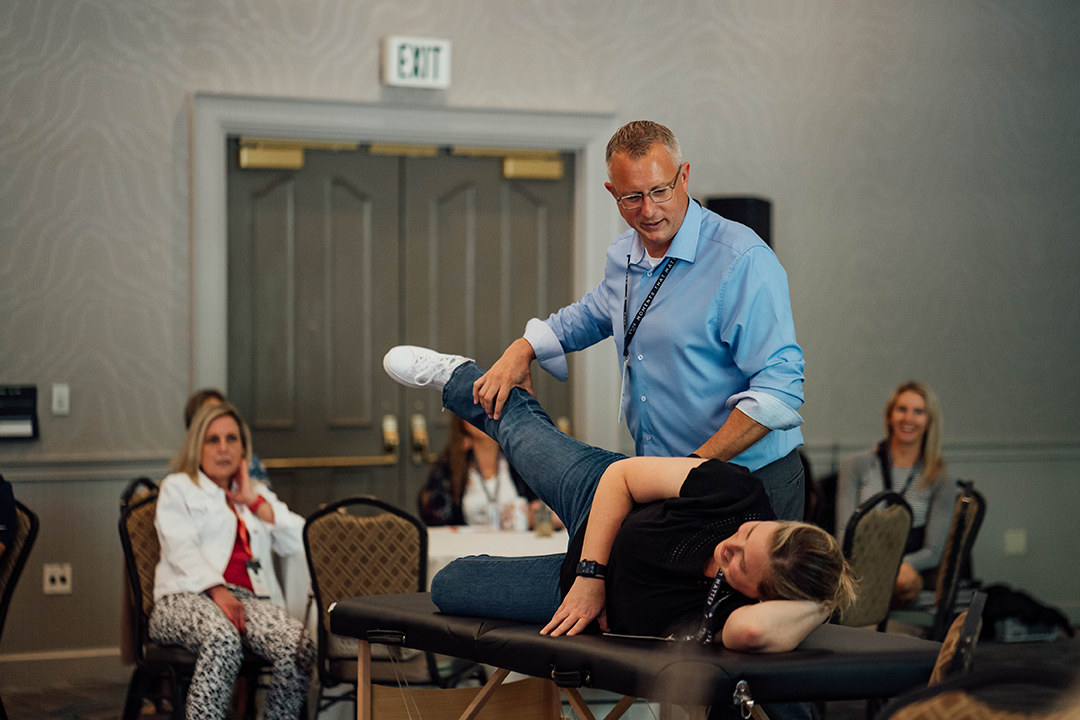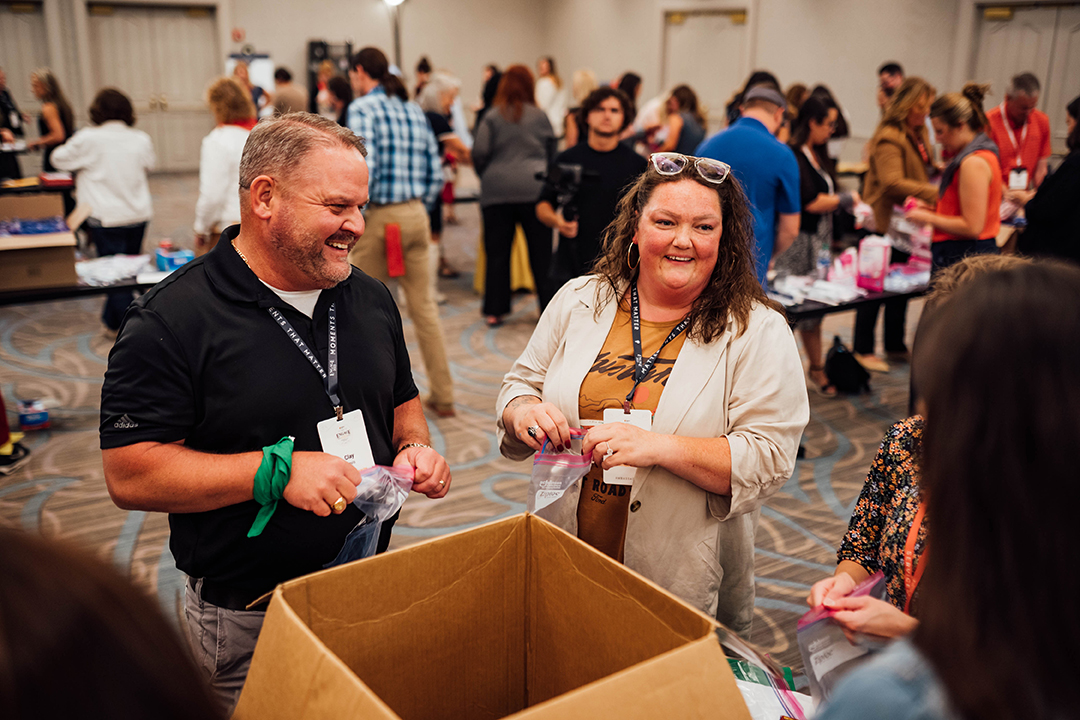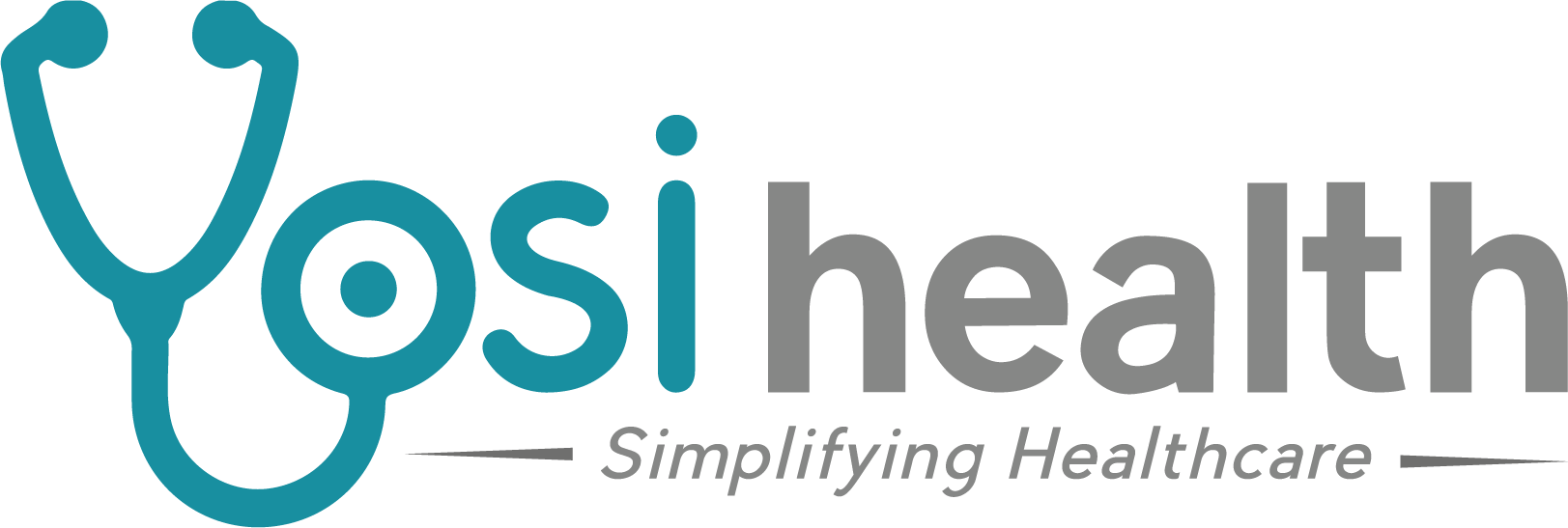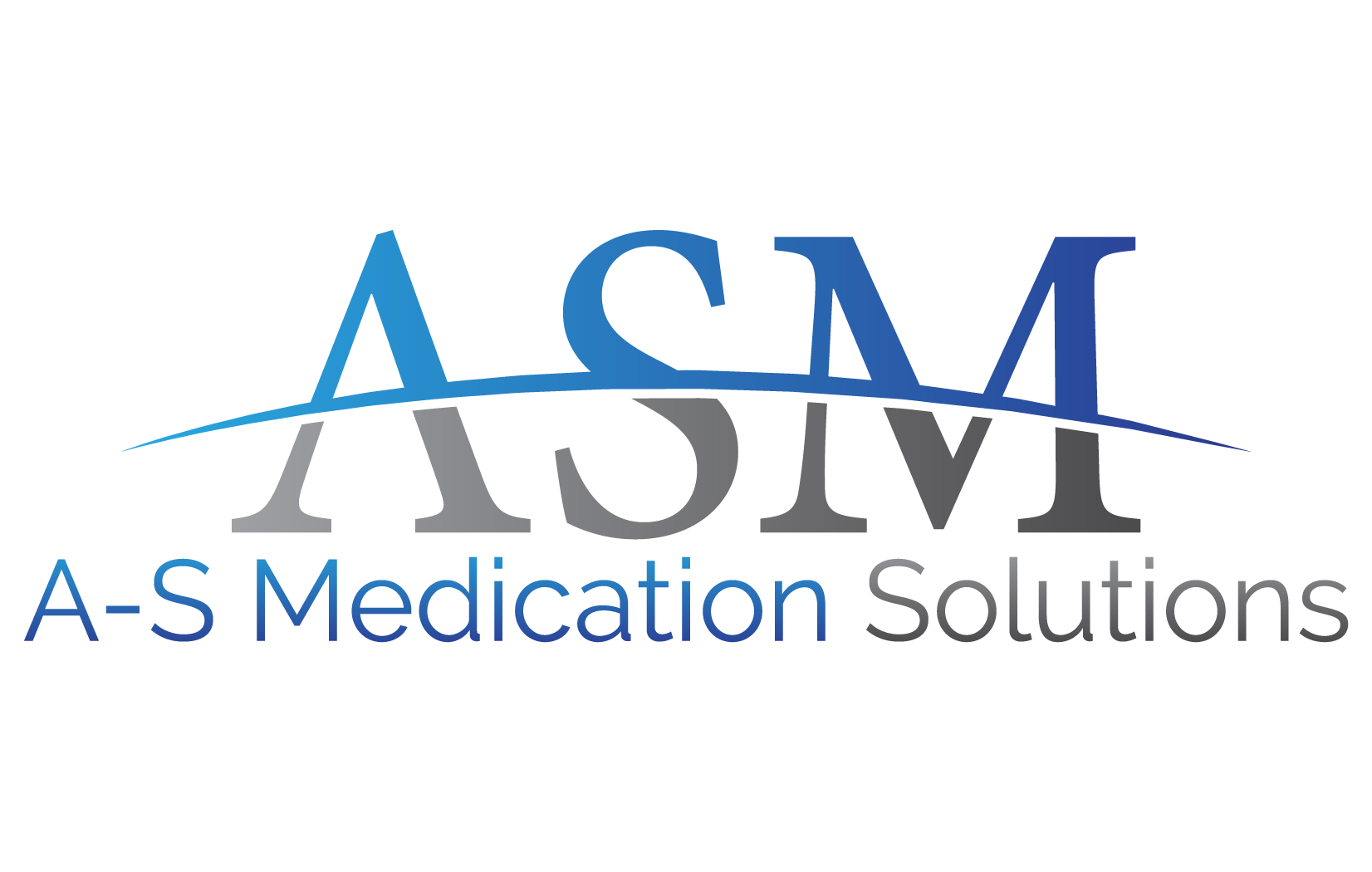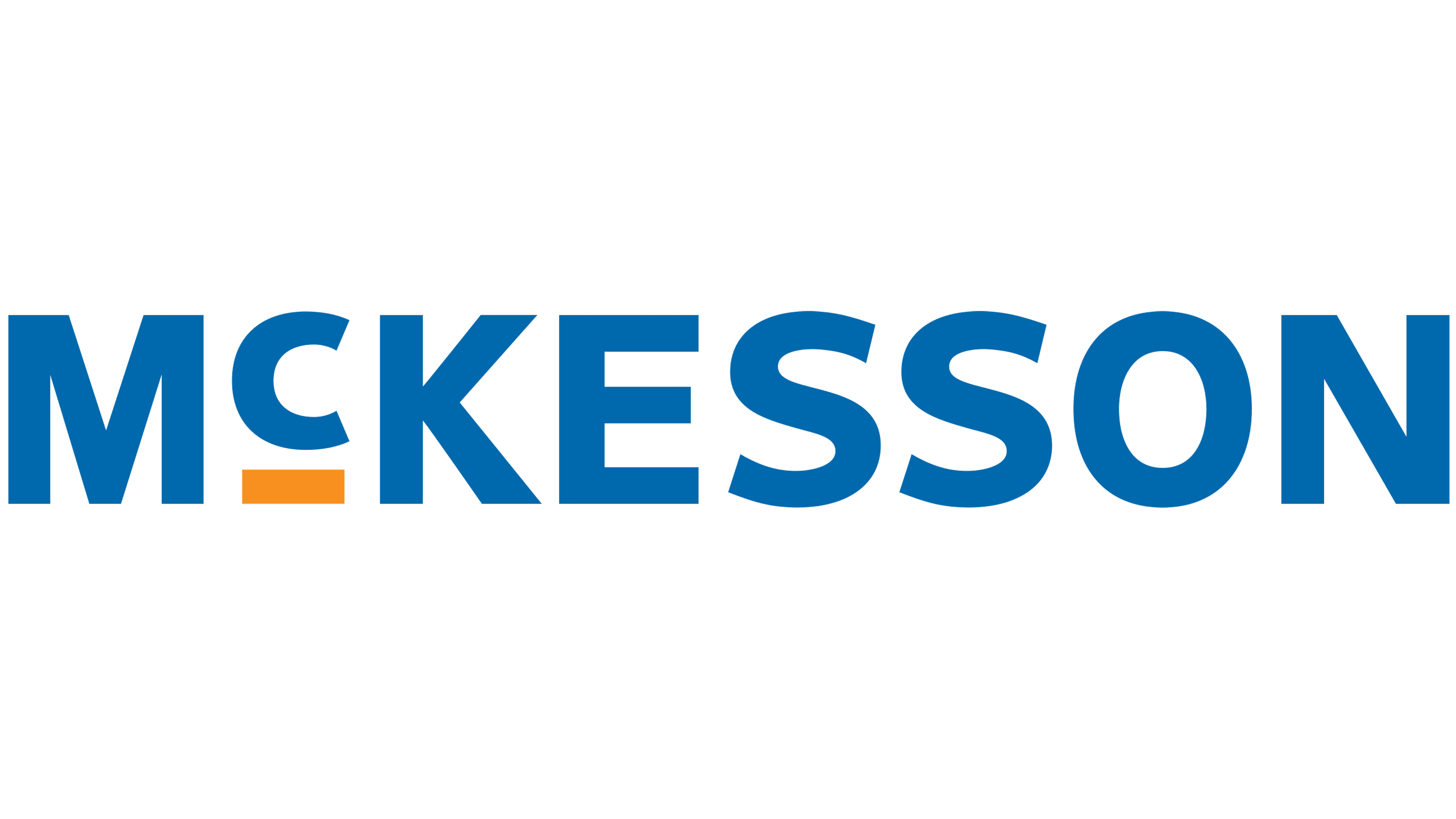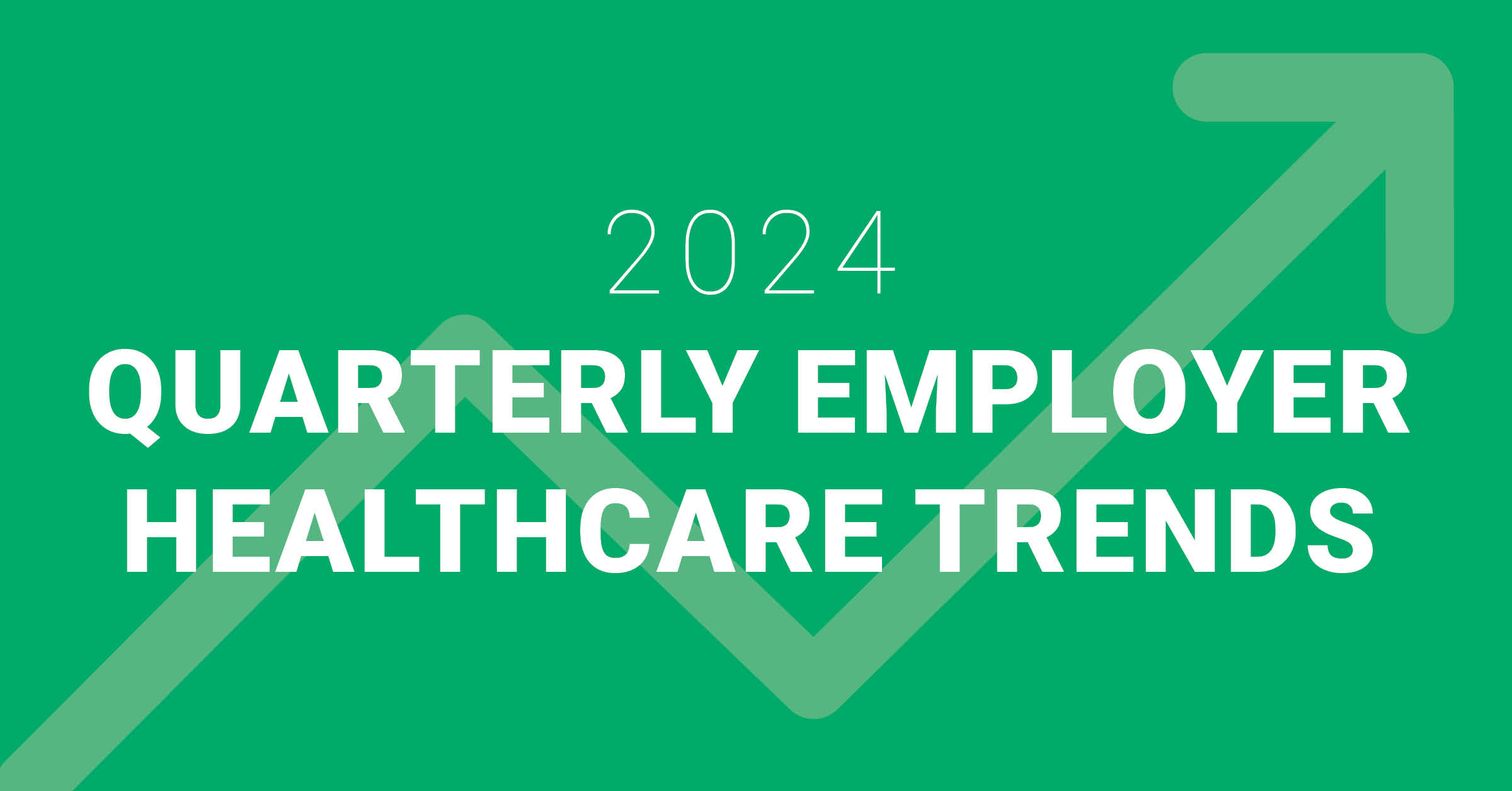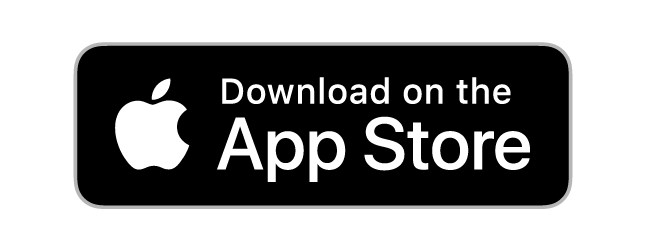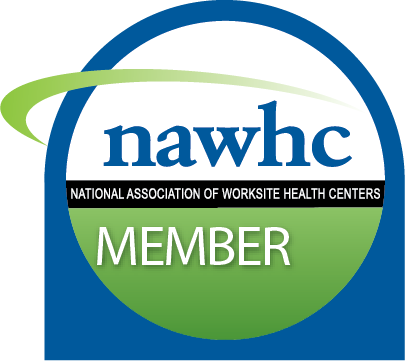Every year, Marathon Health comes together with clients, benefits consultants, industry experts and Ambassadors to network, learn from each other, strategize for the future, and celebrate our success. On Sept. 12-14, we connected again for the Engage 2023 conference, which was held at the beautiful Chateau Elan Winery & Resort in Braselton, Georgia, to celebrate the wonderful Moments that Matter.
Those moments included honoring our members who’ve made significant improvements in their health and recognizing our clients who have made a commitment to help their employees live their best lives. By partnering with our employer health centers and offering advanced primary care services, health coaching, behavioral health, physical therapy and much more, the clients and benefits consultants we work with are truly making an impact on improving lives across the United States.
The three days were filled with educational sessions and interactive roundtable chats, including a warm welcome from Marathon Health’s CEO and co-founder Jeff Wells MD, who celebrated the impact everyone in the room was making on our members’ lives. Attendees also learned strategies for increasing health center engagement, taking advantage of health coaching, using advanced analytics to help them reach their healthcare goals, breaking down barriers to mental health, and tackling chronic conditions through wellness programs.
Robyn Benincasa, the keynote speaker and a World Champion Adventure Racer, inspired attendees to build teams to adapt, overcome and win in the face of extreme challenge and change. She reminded everyone that winning comes down to relying on each other.
Engage 2023 wouldn’t be complete without some time to get to know each other and have fun. Attendees enjoyed an opening reception, a dine-around experience, wine tasting, a morning walk, a teambuilding event, charitable activity for a mission trip, an awards ceremony and more.
Thank you to our event sponsors, who made this year’s event an astounding success: McKesson, AS Meds, SaveRX, RecoveryOne, Yosi Health and LabCorp.
What Attendees Had to Say about Engage 2023
“I fell in love with Marathon quickly and this event cemented it for me. The people and culture seem incredible, and the business model is truly changing lives.”
“I sincerely believe that was the best-executed client symposium I have attended. Perfect mix of content/networking/socializing.”
“The content and the ability to connect with additional Marathon leaders and customers was excellent.”
“I am always blown away at the amazing work other organizations are doing around the country. Coming together with like-minded people with similar passion and purpose provides that extra motivation to keep pushing and keep doing what we do.”
“[The conference] really gives you an opportunity to learn more about our client advocate, as well as engage in a more relaxing environment with our peers. Just the conversations you can have over dinner and drinks are very valuable.”
“The sessions all had relevant content and presenters. Very well organized. I found a lot of value in the sessions featuring new products or services that we were not aware of or using today with our clients.”
Check Out Some of the Photo Highlights
Jump to a section ↓
- Engage 2023 Welcome
- Keynote: Building Teams Who Face Challenge and Change Successfully Together
- Transforming Lives for the Better
- The Outcomes that Matter Most
- Put Me in Coach: Our Care Model + Your Health Journey
- Cracking the Code on Engagement
- Advancing Primary Care Access Through Networks
- We Still Have Work to Do on Mental Health Stigma
Engage 2023 Welcome
Presenter:
Jeff Wells, MD, CEO and Co-Founder of Marathon Health
The traditional model of healthcare isn’t working. We face barriers to care, providers spend too little time with patients because health systems focus on the number of patients seen rather than getting patients healthy, and healthcare costs continue to skyrocket. Rather than sit back, employers and HR leaders like the ones who partner with Marathon Health and attended Engage 2023 have stepped up to truly improve the health of employees.
“I want to thank you all for investing in the employer healthcare model and for partnering with Marathon Health on the journey together,” Jeff said as he welcomed everyone to Engage. “We represent over 1 million lives that we can impact across the country, and there’s a lot of those that we haven’t impacted yet, and I think that’s the opportunity.”
Jeff shared a story about Michelle, a Marathon Health member, who works with Chatham County. She visited the employee health center for her annual physical when she learned her A1C was elevated, which put her in the category of pre-diabetes. “Michelle connected with the registered nurse and health coach, who gave her the tools and information to get started on improving her health,” he said. “She started participating in the diabetes program to help her with monitoring her weight, activity level and meal planning, and she also met with a behavioral health counselor. Today, Michelle says she’s in the best shape and living her best life.”
It’s transformational stories like these, the moments that matter, that keep all of us motivated, and they’re only possible through folks in the room, Jeff said.
The key to transforming lives comes down to rewarding clinicians to drive outcomes that matter to patients, increasing preventive screenings to catch chronic conditions early and helping to motivate patients so they become invested in making lifestyle changes to improve their health. Jeff encouraged everyone to network and discuss how we can keep making positive impacts on employees’ lives during the event. “Learning together is what makes all of us better,” he said. “This is a collaborative endeavor.”
Jeff highlighted each of Marathon Health’s core values and what they meant for everyone in the room.
Integrity: Do the right thing and make decisions that will set us up for long-term success.
Compassion: Build better-trusted relationships on a deeper level.
Respect: Be open to opinions, even if they aren’t the same as our own, and truly be selfless to put others first.
Exceptional service: Deliver on our promise and drive value that our partners expect and continue to make improvements together to improve members’ lives and reduce the total cost of care.
Teamwork: Show up every day to work together to be a better organization for each other and all of our partners.
Jeff asked attendees to consider the values during the event, provide feedback and think outside the box so that they could create more moments that matter now and into the future. “We are all going to be better because of the investment of time you made to come here, and we’re sincerely grateful for that.”
Keynote: Building Teams Who Face Challenge and Change Successfully Together
Presenter:
Robyn Benincasa
Robyn Benincasa, a 20+ year veteran San Diego firefighter, World Champion Adventure Racer, and founder of The Project Athena Foundation, inspired Engage attendees during her keynote presentation about being a world-class leader and embracing the adventures ahead.
“If there’s one thing that every one of you HR leaders knows right now, it’s dealing with the crazy pace of change and challenge in your world,” Robyn said.
Those challenges include the headwinds we all face with the economy; the evolution of technology, bringing in new processes and solutions; the regulatory, legislative and compliance landscape; managing employees’ wants, needs and expectations; finding and retaining talent, providing world-class benefits while reducing benefit costs at the same time; and, of course, it was all prefaced by a pandemic that knocked every HR leader off their feet.
“If we’re being honest, since the day you jumped on this party bus, you’ve never had the same day twice. Change and challenge are the only things that stay the same in your life,” Robyn said.
It’s how we respond to times of incredible challenge and change that dictates our success. Robyn shared more about her experience as an adventure racer with a team of five in a remote area on Earth. Each team has a set of maps and rules, and whichever team gets to the final destination in 600 to 1,000 miles first wins. “Everyone has to stay together within 50 yards of each other from start to finish,” Robyn shared. “And, if one person on your team quits, your entire team is disqualified. The most important thing we learned had nothing to do with sports.”
The secret to success relies on your team, Robyn reminded the audience. “A lot of the magic really happens for us in terms of our outcomes when we inspire individual superstar team members to also be great teammates.”
World-class teams are consistently ruled by the hope of success versus the fear of failure. Robyn says the next time you’re faced with a difficult challenge, think about where your brain goes or hibernates. “Are you a person that lives in what are my fears, my concerns, my obstacles, my worries? Or are you a person who says, yeah, I got all this craziness going on, I still have to get to my finish line? Maybe I just have to find a more creative, more innovative way to win.”
Each of us needs to focus on the comeback, not the setback. Sometimes things happen in your life or career or in the world, Robyn said, and you look back a couple of years later and say, ‘You know what? In some crazy way, it’s one of the best things that ever happened to me.’
Standout teams are also always ‘we’ thinkers versus ‘me’ thinkers. “Your ability to keep climbing when you have big hairy goals isn’t just a matter of reaching up and trying harder as an individual,” Robyn says. “It’s often a matter of reaching out and roping up to other people who have strengths, talents, skills, and background and experience that you may not have.”
Winning comes down to relying on each other. What if we all commit as leaders to being responsible and accountable for getting each other across the finish line? “We can’t do this without each other,” Robyn said, advising the audience to change their mindset. “Find a way to discover and capitalize on each other’s strengths and throw a towline to a teammate when they need your expertise or support. Because when people work with you, grabbing a towline would never be seen as a weakness. It should be understood … that’s how we win.”
Transforming Lives for the Better: One Member at a Time
Presenters:
Allie Widau, Client Development Manager, Marathon Health
Natosha Bass, Regional Director, Client & Care Team Experience, East Region, Marathon Health
Andy Neal, Market Clinical Lead Family Nurse Practitioner, Marathon Health
J Wynn, HR Director for Benefits and Salaries, St. Johns County School District
More than 10,000 St. Johns County School District employees, spouses and dependents enjoy access to three Marathon Health Network Health Centers in the greater Jacksonville, Fla. area, where they can receive advanced primary care, behavioral health support, chronic condition management, occupational health services and more — all at no cost.
Over the last seven years, the district achieved exceptionally high member engagement with Marathon Health services, resulting in positive health outcomes, employee satisfaction and reduced health costs.
Host Allie Widau spoke to the panel about the keys to the highly successful partnership between St. Johns and Marathon Health, which has led to:
- 75% member engagement
- 70% of high-risk patients making improvements on biometric risk factors
- 27% reduced claim spend on engaged members
- 96% member satisfaction score
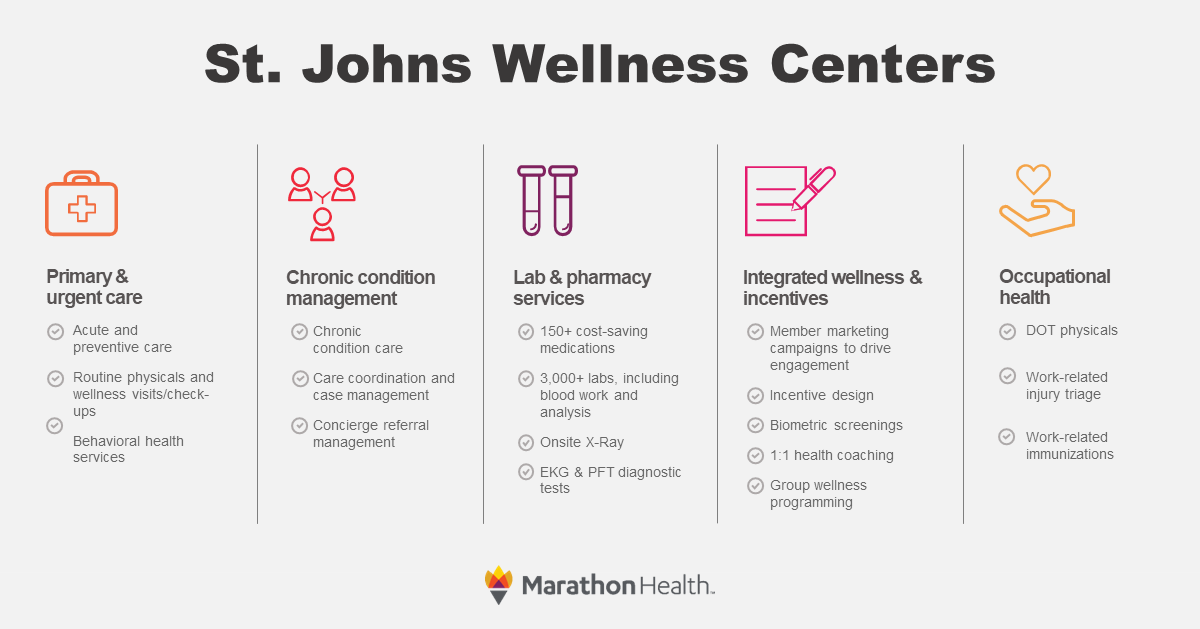
Andy mentioned how Marathon Health isn’t just another benefit, but a trusted partner that fully integrates into the district’s employee culture. He credits the district’s success to having open, daily communication with Natosha and other Marathon Health employees.
“Collaboration between Marathon Health and St. Johns and the Bailey Group (the district’s benefits broker), all of us together, is really what’s necessary to successfully complete the task,” he said.
J agreed, and talked about ways the district fully integrates the health center services into the employee experience, from their initial pre-employment drug screen and orientation to incentive programs and regular engagements with providers.
“We have the HRA program, our screening program and webinars,” J said. “We also have the Marathon staff be present at job fairs, induction meetings and the flu clinics — there’s just so many opportunities.”
St. Johns offers several services beyond primary care to meet their employees’ unique needs, including occupational health services, virtual visits through Marathon Health Anywhere and, most recently, behavioral health support.
“We weren’t sure how this was going to work out, but it exploded from day one — it was just so well-received,” J said. “It was overwhelming to the point that we had a waitlist and needed to hire two additional part-time counselors. So, if you’re thinking about adding mental health and you’re having concerns, take the plunge. It will be worth it.”
Beyond remaining flexible and adapting to employee needs, J said removing barriers to accessing care and focusing on the employee experience boosts satisfaction, which translates to healthier members and reduced medical costs.
“We try to make sure every opportunity or every engagement with our members and their families is a pleasant one,” J said. “And that can be as simple as making the appointment-setting simple and seamless, from check-in to follow-up visits and referrals. It keeps our members engaged and wanting to come back.”
Another key to St. Johns’ success is having full leadership support for their partnership with Marathon Health, from the superintendent to the executive board. The district’s leadership team not only utilizes the health center, but actively promotes Marathon Health services to district employees.
“All of these people are so proud that we have these centers,” J said. “They often brag about us being one of the few districts that has this to offer. We definitely use it as a recruitment tool, but they also get excited about the engagement numbers and the cost savings.”
The Outcomes that Matter Most
Presenters:
Katie Haas, Client Development Director, Marathon Health
Robert Simes, Vice President of Analytics & Business Intelligence, Marathon Health
Jon Schloemer, Sr. Consultant, NA Health and Welfare Plan, Cargill
When asked what clients hope to achieve through a partnership with Marathon Health, the responses typically center around improving the health and wellness of employees while saving on costs. Marathon Health aims to help clients achieve those goals through the Quadruple Aim, the framework by which we operate:
1. Empower care teams
2. Engage members
3. Improve health outcomes
4. Reduce healthcare costs
Marathon Health empowers providers by giving them the tools they need to succeed, such as allowing for longer visit times and teaching motivational interviewing. By investing in happy providers, patients receive better care. This is evident in Marathon Health’s NPS of 86.
“As a clinician, you want to create a relationship with a member that keeps them coming back and investing in their health care,” Robert said. “That 86 NPS tells us our members are actively understanding and appreciating what we’re delivering from a clinical value.”
Access increases too, with 98% of members reporting being able to receive service at their preferred time, and 84% noting just 5 minutes or less in the waiting room. When delivering outstanding care, patients become engaged. Marathon Health members average 3-4 health care visits per year.
“Satisfied patients are return patients,” Katie said. “Then, we have the opportunity to improve health outcomes.”
Healthier patients cost their employers less, too, in terms of both claims and reduced absenteeism. Among the per-member spend by the top five major diagnostic categories in 2022, engaged members spent $1,543 less each on average.
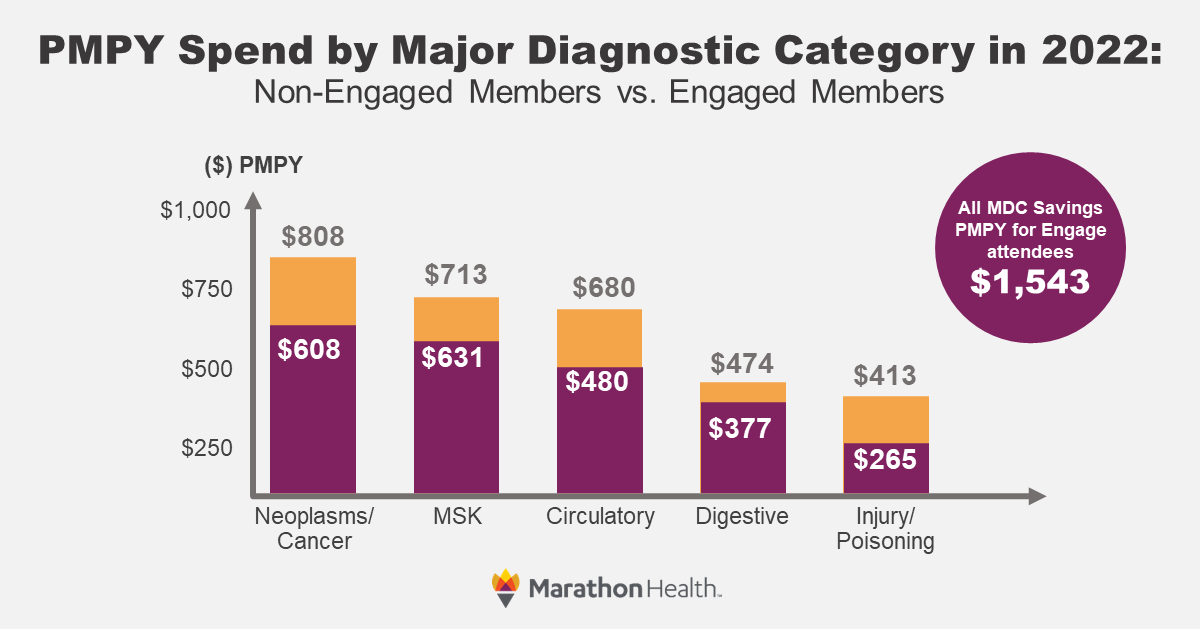
“Getting engagement rates higher not only is great for the patient to have a great established relationship, but fantastic in terms of aggregate clinical performance, and then aggregate financial performance,” Robert said.
In a 5,000-employee workforce, an engagement rate increase from 25% to 30% would boost ROI from 1.16 to 1.40.
Cargill, a company of global food, agriculture and bioindustrial specialists, had two goals when partnering with Marathon Health: providing employees with convenient access to care they could trust and financial stewardship.
With many of their employees speaking English as a second or third language and lacking comfort or familiarity with the U.S. healthcare system, building trust proved crucial. Longer appointment times allow Marathon Health providers to offer high-quality care with language and cultural support.
Engaging these employees in their health care preventively drives savings. “A lot of our population avoids going to the clinic, then ends up resorting to the ER because something is seriously wrong,” Jon said. “And we all know what that does from a cost standpoint. We also know what it does from a recovery standpoint if we’ve gotten to the point where we have something very serious in nature. So that’s where comfort and trust become important.”
Once an employee or family member has a positive experience in the health center, word of mouth spreads. Cargill boasts a 90 NPS. “You’re always going to have claims spent,” Jon said. “But when you’re being proactive with those dollars, you’re investing in the clinics and employees. By spending the money upfront, you’re stabilizing your employees’ and their families’ lives and making it easier for them to take care of themselves in a system that can be very challenging.”
Put Me in Coach: Our Care Model + Your Health Journey
Presenter:
Lauren Hutchens, National Director of Health Coaching & Wellness, Marathon Health
The Marathon Health care model is rooted in health coaching, meeting members where they are at in their healthcare journey and helping them meet their goals. All care teams and health coaches focus on supporting members through sustainable behavior changes, such as improving sleep, creating an exercise plan, eating healthier or helping a member improve a chronic health condition.
“Less than 25% of a health coaching session should be education,” Lauren said. “We don’t do most of the talking, the member does. The beauty of health coaching is that it’s very relationship-focused. People will be more likely to open up to their health coach and share things that they may not even share with their primary care provider.”
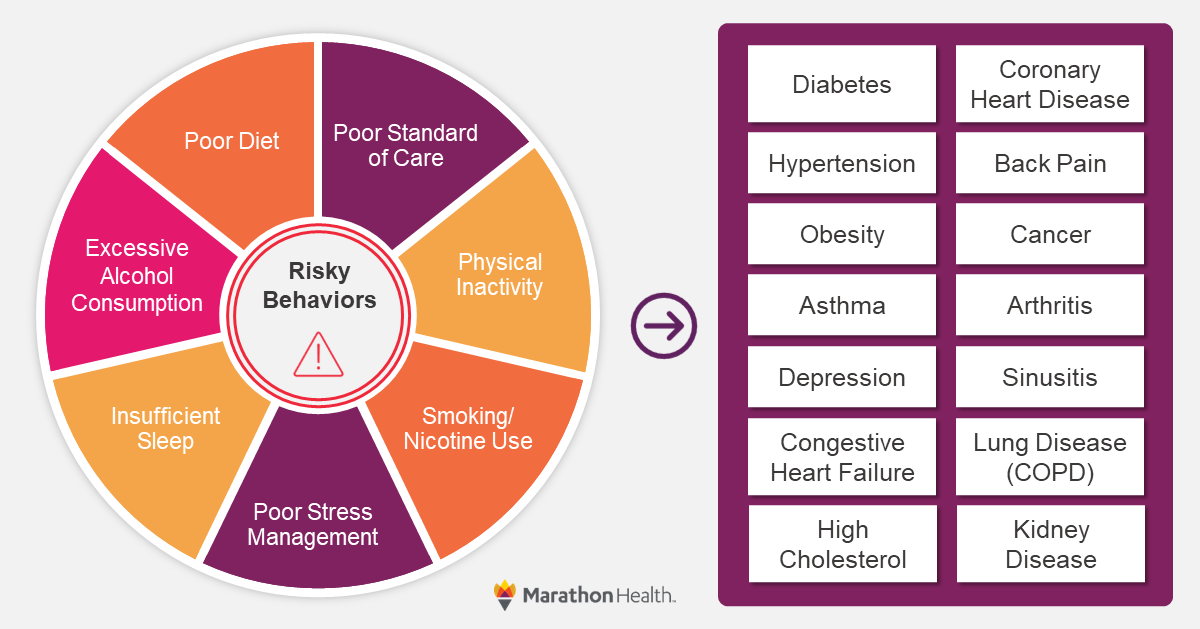
Marathon Health’s NBHWC-certified (National Board for Health and Wellness Coaching) coaches address the top seven risky behaviors — like poor stress management or nicotine use — that drive the 14 health conditions that account for 80% of healthcare costs, hospitalization and healthcare visits worldwide. These conditions include asthma, diabetes, hypertension and back pain.
“When you engage with a health coach and you’re diagnosed with depression, there’s evidence of reduced anxiety, improved mood and stress levels, improved relationship satisfaction and increased self-regulation,” Lauren said. “There’s improved physiological outcomes when cancer patients work with a trained health coach. And when we look at coronary heart disease and some metabolic syndrome-type symptoms and diagnoses, there are significant improvements in overall risk of disease.”
To showcase health coaching and motivational interviewing in action, Lauren walked Engage participants through the practice of creating a wellness vision. In wellness coaching, first you ask the member to describe their vision.
“Very rarely would the wellness vision be, ‘I’m going to be X weight or I’m going to lose X amount of pounds.’ It’s not about the number,” Lauren said. “It’s about what’s meaningful to you. Maybe it’s seeing your baby graduate college.”
Then, you paint a picture through vision boarding. The coach discusses the key elements in achieving that vision. “If you keep these in mind, how will they empower you to move forward and help you stay on track? Do you need to look at your environment? Do you need to go in and see your provider to change your medication?” Lauren asked.
The coach then asks their client to imagine a time they were at their happiest. “And we get to explore that,” Lauren said. “I call it the coaching high, because that’s when you see people start to have an aha moment. It’s just really powerful.”
A coach guides members through creating their core values. “The reason our core values are so important is because health and change are intimately connected to your core beliefs and your health perceptions.”
To complete a wellness vision, the coach will discuss motivators, challenges, one’s support system and strategies to reach that vision. “We’ll ask people to commit to that health vision. ‘How ready, confident, how committed are you to that vision?’ And we’ll continue to revisit that.”
Lauren encouraged everyone attending the session to schedule a visit with a health coach, if they hadn’t already. “Come see the power of health coaching,” she said.
Cracking the Code on Engagement
Presenters:
Sheri Rich, Director of HR-Employee Benefits, Keller Independent School District
Shurice Hunter, Human Resources Director, City of Rockford
Shannon Isom, Sr. Director of Engagement, Marathon Health
Successful engagement with employer healthcare doesn’t look the same for every population. Customizing a strategy to meet the unique needs of employees can help drive meaningful results.
During this session, Shannon dug into the four levers that influence overall health center engagement and talked about how to increase engagement with employees who are high-risk or have chronic health conditions. The levers include:
- Leadership support
- Incentives
- Member marketing
- Care team outreach
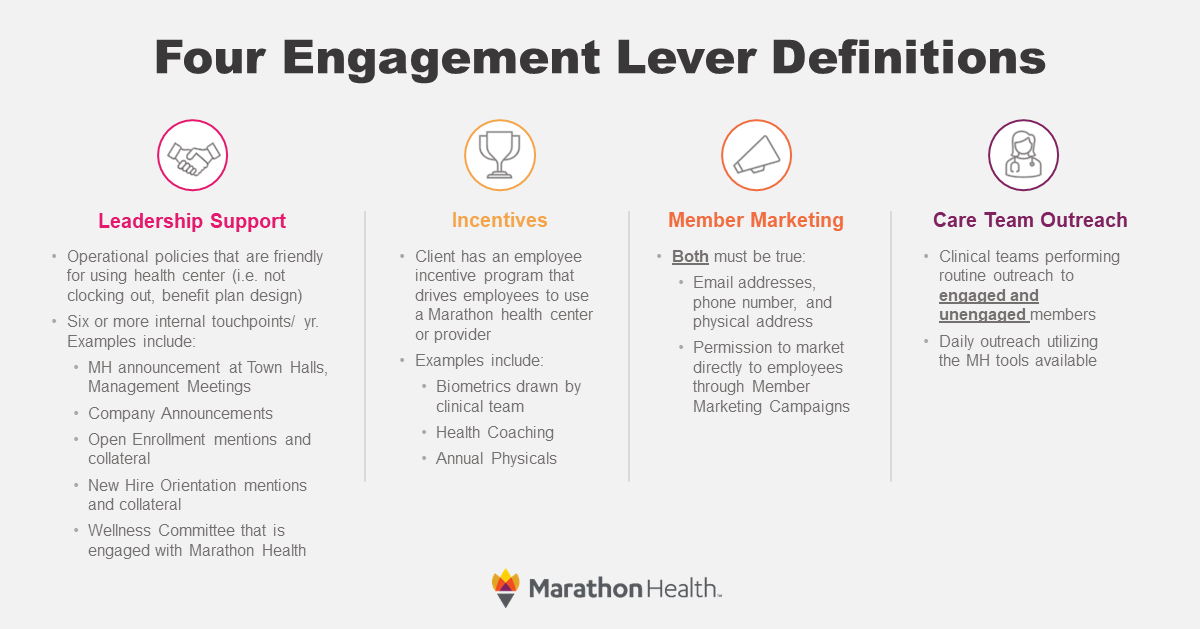
“Everybody here in this room must come together as a partnership to build awareness, whether that’s internal messaging or onsite events,” Shannon said. “Sometimes people just need a little encouragement to prioritize their health.”
Incentive programs can help encourage engagement and might include rewards or discounts on insurance premiums for getting a biometrics screening, health coaching or an annual physical. Member marketing materials can also help inspire employees to prioritize their health, whether that’s through emails, text messages, postcards, posters on the job and more.
The final lever comes back to provider outreach. “Our compassionate providers and health center teams reach out to members directly. I know if I get a call, I’m more likely to schedule an appointment,” Shannon said.
Shurice said leadership support has the most positive impact on engagement for the City of Rockford. Sheri agreed and said the close second is incentives for Keller Independent School District.
Shannon showed engagement numbers across various industries during the session. Clients who took advantage of more engagement levers saw higher engagement with the health centers. For example, clients who used all four levers, saw an average 57.1% engagement rate.
At the City of Rockford, Shurice said they offer a premium discount to employees who take advantage of earning incentives, which might include getting a biometric screening, tracking wellness through the Marathon Health portal, participating in the SPARK Total Health group program, flu shots and other wellness activities.
Communicating with employees about everything that’s offered is also high priority. “We have a monthly newsletter,” Shurice said. “We have televisions in certain areas that include information and whiteboards throughout our entire facility as well. And I make sure every elevator has a flyer. I’m bombarding them with information.”
Sheri said almost 90% of their employees at Keller ISD actually participate in their incentive program to save $720 annually on their premiums. Their 3 in Green program encourages employees to get their biometric screening and have three out of the five biometric markers in good range to get credit for the screening. “If they don’t meet the three out of five, then they have to have a health coaching visit,” Sheri said. “That really drives our employees to the wellness center to get their checkup and understand their numbers.”
Keller ISD also makes it easy for employees to use the health center when they need it. “They don’t have to clock out to go to Marathon Health, which saves them that half day or full day of taking their own personal leave to see a doctor,” Sheri said.
Throughout the engagement session, Sheri and Shurice shared some videos of their employees who have had great experiences with the health center. One of those members shared how she enjoys time with the providers and also the ease of getting an appointment. “Trying to get appointments with my regular primary care physician was really difficult,” the member said. “I was scheduled for an appointment late last year for nine months away, and in the interim, I was able to see Dr. Dave at the wellness center. He took the time to go over each and every individual lab and what my levels were. It was so beneficial to me.”
Shannon asked the panel what their secret sauce was for a successful engagement strategy. Shurice said hands down her most important tip comes down to one keyword: “Communication, communication, communication. You can never over-communicate.”
Sheri says flexibility and promoting incentives is huge in their success. “Find out what works for you.”
Advancing Primary Care Access Through Networks
Presenters:
Chad Ashcraft, Chief Growth Officer, Marathon Health
Kristine Cunningham, Human Resources Director, Kalamazoo County Government
Sabrina Partin, HR Benefits Program Manager, Bluegrass Care Navigators
Travis Eckels, Senior Manager, Employee Benefits and Wellness, Sheetz
Greg Howe, Director of Network Accounts, Marathon Health
Member engagement proves key to a successful employer-sponsored health center partnership. But providing equitable and convenient access for employees and their spouses/dependents can be difficult for organizations with remote employees, workers at multiple job sites and benefit-eligible retirees..
With expanded access via Network and virtual solutions, employers engage more employees, drive better outcomes and see greater ROI.
The panelists discussed the importance of finding the right balance of access for employees and their families, whether it be onsite, Network or virtual solutions. “The key takeaway here is essentially the results that we see in the Networks, Anywhere and those from our hybrid clients are on par and in pace with the same results we see in our onsite health centers,” Chad said. “You’re not sacrificing anything; you’re actually gaining more by increasing access.”
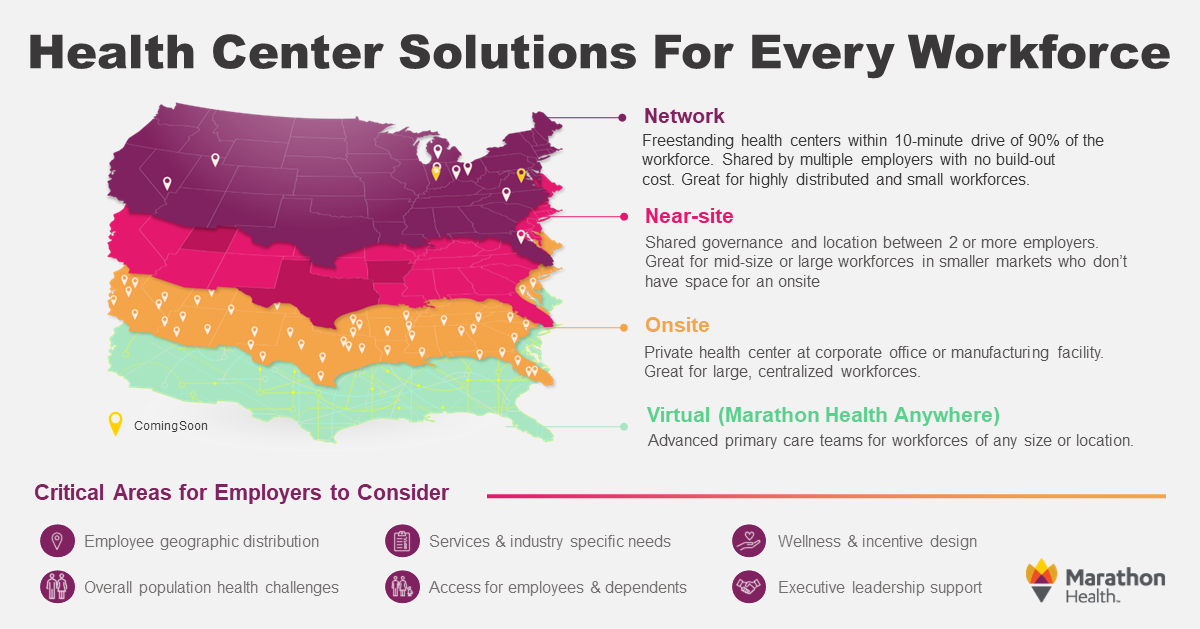
Greg kicked off the discussion by asking the panelists why their organizations chose Network and virtual care offerings.
Travis mentioned how Sheetz currently operates 22 retail stores across the Columbus, Ohio, metro area with dozens more planned to open in the coming years. The organization runs a Marathon Health center at its headquarters in Pennsylvania, but with a majority of employees working in the field, they needed a way to expand access.
Joining the Marathon Health Columbus Network offered a turnkey solution and enhanced convenience by giving employees access to five health centers around the city. “We were able to flip the switch,” Travis said. “It was already up and established, and the implementation was really quick.”
Providing Network access also gave Sheetz a powerful recruiting and retention tool. “Even if you work one shift a week, you’re just as eligible as someone that’s working full time,” Travis said. “It’s really about trying to help with recruiting, get retention up, lower turnover and see how it impacts our costs.”
Sabrina talked about how Bluegrass Care Navigators needed a simple solution to connect 800 employees in all corners of Kentucky with high-quality primary care. The organization was already familiar with virtual care, so adopting Marathon Health’s Anywhere solution made sense. In the first 18 months, 40% of employees have engaged with virtual care.
“It’s completely free access for them,” Sabrina said. “They can see the Marathon doctors and hopefully put themselves first in a way that they wouldn’t do if they had to sit in a doctor’s office for 40 minutes, wait another 20 minutes in the backroom and then see the doctor for five minutes.”
The City of Kalamazoo didn’t have the budget to build a health center from scratch, and they couldn’t find a site downtown with ample parking. Instead, they joined the newly built Kalamazoo Network. “The Network was definitely the way to go,” Kristine said. “Our center is right off the freeway, and it’s very obvious.”
Next, the panel took questions from Engage attendees who were curious about expanding Marathon Health services via Network and virtual offerings.
How Do Labs Work in a Virtual Care Setting?
Sabrina explained how labs with Marathon Health Anywhere work similar to an in-person appointment. “The member makes the appointment with the provider, and the provider calls it into whatever lab they choose. The lab then sends the results to that doctor, and they automatically flow into the electronic medical records.”
A Marathon Health provider typically reaches out to the member if something problematic surfaces in the results.
How Does the Network Solution Help if a Company Already has High Engagement at an Onsite Center?
Kristine mentioned how the Kalamazoo Network makes it easier for spouses and dependents on the City’s health plan to access primary care, as well as their employees who work from home full time.
“With the Network approach, it really allows them to access the health center without coming onsite to their spouse’s work. Now, they can drive at their convenience, they can pick up their kid from school and take the child to these Network facilities.”
How Does Pharmacy Work with Marathon Health Anywhere?
The organizations that offer Marathon Health services provide hundreds of common prescriptions at little to no cost to members. The low costs remove barriers and improve medication compliance for members.
“We partner with Sav-Rx,” Greg said. “At the end of the appointment, they’ll send the member a Sav-RX card through the patient portal that they can take to any pharmacy. They can fill that prescription for the exact same cost as if we were to dispense it within the Network.”
For refills or new prescriptions that don’t need to be filled immediately, members can request free home delivery. “While the Networks may operate slightly differently than a Partnership where you’ve got the care team on your campus, at the end of the day, it’s the same member experience,” Greg said.
We Still Have Work to Do on Mental Health Stigma
Presenters:
Erin Thase, National Director of Behavioral Health, Marathon Health
Kristin Fannon, Wellness Coordinator, Duncan Aviation
Jill Ryan, Health Center Director, Duncan Aviation
Jana Goolsby, Wellbeing Program Manager, City of Olathe
Elizabeth O’Neill, Senior Product Manager, Marathon Health
Statistics show that 60% of employees don’t seek mental health services due to fear or stigma, while 62% have left a job for mental health reasons. In order to appropriately meet the healthcare needs of their workers, many employers are providing access to mental health resources, but more needs to be done to break down the stigma.
“The workforce is changing,” Erin said. “Individuals are looking for their employer to be more than just a place where they go to work. The idea that you leave everything at home, show up, get your paycheck and go back home is just not how it works anymore.”
Consider these statistics:
- 70% of managers have the greatest impact on an employee’s mental health
- 64% of employees state mental health has affected their ability to do their jobs
- Mental health issues account for $1 trillion loss in productivity globally per year
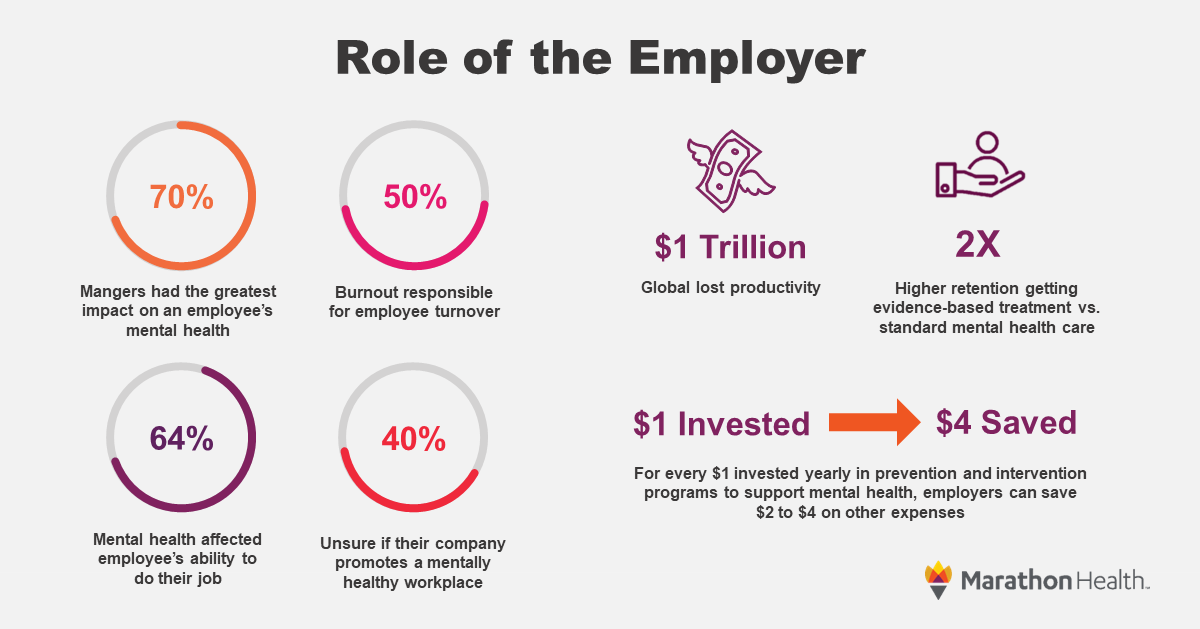
Employers providing mental health resources increases employee well-being and also benefits their bottom line. For every $1 invested yearly in prevention and intervention programs to support mental health, employers can save $2 to $4 on other expenses.
Just offering behavioral healthcare helps normalize the need for mental health services. “Implementing resources has really helped to break that stigma because it shows our team members that we do care, and we’re offering resources because we know that it [mental health] is impacting every single person,” Kristin said.
Allowing employees to use that care on the clock helps remove the barrier of taking off time to receive health services. “Every service that’s provided by our health center is provided on work time,” Jana said. But often that means educating managers on the benefits of the service. When a manager called her about an employee who was utilizing mental health care weekly and noted their attendance issues, it provided that opportunity.
“I said, ‘Well, Mr. Manager, they might have an attendance issue because they’re struggling with their mental health, and by getting help with their mental health, that might fix your attendance issue.’”
More than just providing access, employers need to start conversations around mental health. “It’s about having conversations with leadership. It’s about talking about how one in five people have mental health symptoms that significantly impact their daily functioning,” Erin said. “It’s really about the community and building relationships and having training and conversations about it with your members.”
The City of Olathe conducts supervisor training every quarter and focuses one of its sessions on mental health to further that education. “People started sharing testimonies about their mental health struggles in front of this whole group of supervisors,” Jana said. “And it started to lower that stigma.”
Lastly, know that reducing stigma doesn’t happen overnight. “It takes time to drive behavior change,” Elizabeth said. “Not only in individuals, but to create a cultural shift from resistance to engaging in this type of service to making it not only acceptable but something people get excited to share with each other.”
You might also like
Subscribe to our newsletter and stay on the cutting edge of worksite healthcare.


